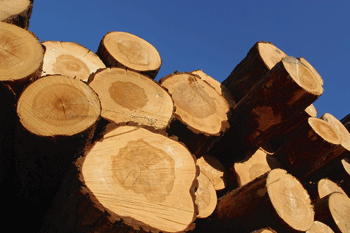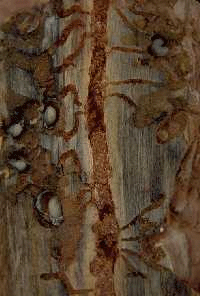BC First Nations demand conclusion to treaty talks as province signs another deal
BC delivers money to First Nations to help in pine beetle battle
BC First Nations demand conclusion to treaty talks as province signs another deal
Members of more than 40 First Nations in British Columbia are demanding the federal and provincial governments work harder to resolve negotiations on Native issues.
Chiefs, Elders and other representatives signed an agreement October 28th, called the Unity Protocol, in an effort to overcome an impasse with treaty negotiations.
Chief Robert Louis of Westbank said if demands aren't met, the issue could lead to further action.

``Does that mean blockading roads, does that mean handing out pamphlets, does that mean blockading of railways,'' he asked. ``I don't know if it will go that far but the issue is strong enough to go that far.''
The groups outlined the six key areas they looked to improve on: certainty, constitutional status of treaty lands, governance, co-management throughout traditional territories, fiscal relations, and taxation and fisheries.
Aboriginal Relations and Reconciliation Minister Michael de Jong said the First Nations' sense of frustration is understandable.
“Negotiators have been at this for 15 years,” he said. “First Nations leaders and I and the government, in fact, would like us to move more quickly to final agreement.”
But, de Jong said, with one agreement signed October 28th and another signed October 29th “we are beginning at last… to see genuine progress.”
On October 28th, the province announced it has signed an agreement in principle with a Fraser Valley First Nation that will set the tone in concluding treaty negotiations.
De Jong said the agreement will allow the In-shuck-ch Nation to develop stronger relationships with local government.
He said it will also foster greater involvement in regional economic development and give the In-shuck-ch more control over managing their communities.
The In-shuck-ch Nation community members approved the agreement in principle in April.
The nation represents 907 members from the Douglas First Nation, Samahquam Nation and Skatin First Nations.
In-shuck-ch have been negotiating with the provincial and federal governments since April 2002.
The agreement sets the foundation for negotiating a final agreement with provisions on land, capital transfer, resources, culture and self-government.
The deal provides for a treaty land offer of 145 square kilometres and a cash offer of $21 million which will assist in developing economic opportunities in the region, the government said in a news release.
``The Douglas First Nation is just launching a run-of-river power project with our partner Cloudworks. The treaty should allow us greater opportunities for supplying green power,'' said Chief Darryl Peters of the Douglas First Nation.
Chief Keith Smith of Samahquam Nation said the deal will allow the nation to develop infrastructure most British Columbians take for granted.
``The treaty should allow us to begin to deal with our own problems – isolation, poor roads, no connection to the B.C. Hydro grid, and no landline telephones.''
For the Skatin, the deal is a chance to move into the forestry market.
``Forestry will kick-start our economic engine. Independent power production should help it gather momentum, and the service industry should keep it humming,'' says Chief Patrick Williams.
``We look forward to taking responsibility for ourselves, and not having to wait for other governments," he said.
In Nanaimo, chief negotiator Robert Morales said the government wants natives to give up their rights in return for land.
``Most of us, if not all of us, have now hit the wall on many of the key issues that we are bringing forward,'' he said.
BC delivers money to First Nations to help in pine beetle battle
BC First Nations' efforts to tackle the fallout from the mountain pine beetle epidemic were given a boost October 18th as the province delivered $8.4 million to the newly established First Nations Forestry Council.


(Right) Cut tree killed by Mountain Pine Beetle, showing the characteristic blue staining pattern.
The announcement was made at the Lheidli T'enneh First Nation reserve in Shelley, east of Prince George, where the First Nations Mountain Pine Beetle Initiative Office was also opened.
The funding will help preserve the way of life for many First Nations communities whose traditions and customs have depended on forests for a millennium, said Forests Minister Rich Coleman.
He said the cash, which will be managed through the new office, will be used to establish a land-use planning program.
It will also be used to gather information on cultural and spiritual sites, non-timber forest products, wildlife and fisheries habitat and social impacts.
About 80 First Nations within the beetle epidemic area in north and central B.C. will be able to tap into the two-year funding.
The cash builds on an agreement reached by the province last year with First Nations, which had demanded to be more involved directly with deciding how to deal with the epidemic's fallout.
First Nations from around the province had gathered in Prince George for a two-day emergency beetle meeting.
The funding is the first step in creating a plan for individual First Nations on how they want to deal with the epidemic's fallout, said Dan George, who will head up the beetle office.
First Nations have already identified some ``big-hitter'' items like how to reduce fuel loading around their communities, which increases the fire risk, and diversifying their economies, said George.
At the same time, the Lheidli T'enneh signed an agreement Wednesday with the BC government to receive $914,000 and 1.2 million cubic metres of beetle-killed timber during the next five years.
The Lheidli T'enneh said the timber harvest will help expand its existing operations under LTN Logging. The logging company is a joint venture with Roga Contracting Ltd., which employs about 30 people.